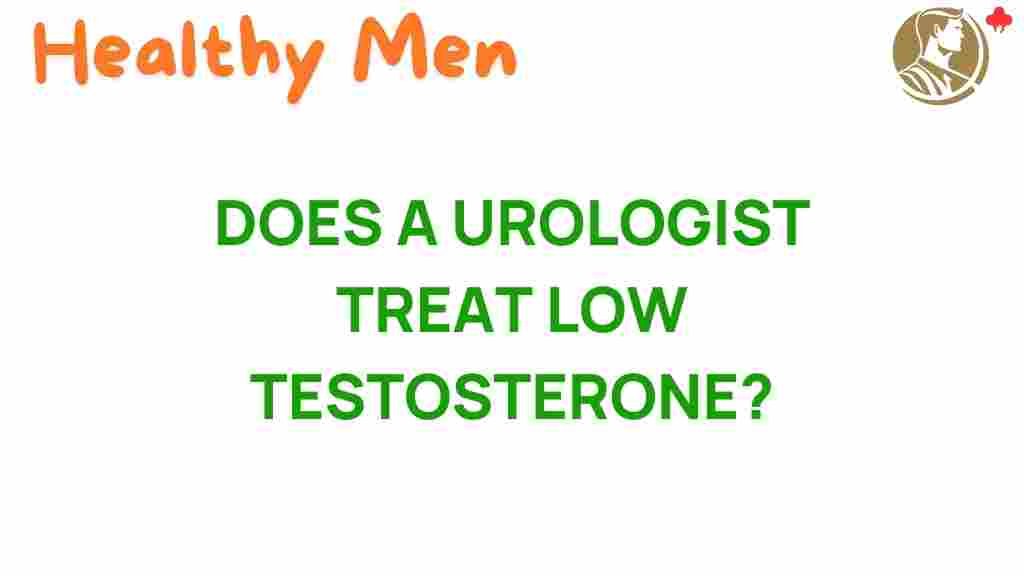Unraveling the Role of Urologists in Low Testosterone Treatment
Low testosterone, often referred to as “low T,” is a common condition affecting men as they age, and it can significantly impact their overall health and quality of life. Urologists play a crucial role in diagnosing and treating low testosterone, which is vital for men’s health. In this article, we will explore the role of urologists in low testosterone treatment, how hormone therapy works, and the importance of health awareness regarding testosterone levels in men.
Understanding Low Testosterone
Testosterone is a hormone produced primarily in the testes and is responsible for the development of male physical characteristics, sexual function, and overall health. As men age, testosterone levels naturally decline, typically starting around the age of 30. However, in some cases, testosterone levels can drop significantly, leading to various health issues.
Some common symptoms of low testosterone include:
- Decreased libido or sexual interest
- Erectile dysfunction
- Fatigue and decreased energy levels
- Loss of muscle mass and strength
- Increased body fat
- Depression and mood changes
If you are experiencing any of these symptoms, it is essential to consult a medical specialist, such as a urologist, who specializes in men’s health.
The Urologist’s Role in Diagnosis
Urologists are trained to diagnose conditions related to the male reproductive system, including low testosterone. Here’s a step-by-step process of how urologists approach the diagnosis of low testosterone:
- Initial Consultation: The first step involves a thorough consultation where the urologist discusses your symptoms, medical history, and lifestyle factors that may affect testosterone levels.
- Physical Examination: A physical exam may include checking for signs of hormonal imbalance, such as breast enlargement or changes in body composition.
- Blood Tests: The urologist will order blood tests to measure testosterone levels, typically conducting tests in the morning when testosterone levels are highest. Additional tests may also be done to assess other hormones and overall health.
Once the diagnosis of low testosterone is confirmed, the urologist will discuss potential treatment options.
Treatment Options for Low Testosterone
Urologists offer various treatment options for low testosterone, with hormone therapy being the most common approach. Hormone therapy can help restore testosterone levels and alleviate associated symptoms.
Types of Hormone Therapy
Several methods are available for testosterone replacement therapy (TRT), including:
- Injections: Testosterone can be administered through intramuscular injections, usually every one to two weeks.
- Patches: Testosterone patches can be applied to the skin daily to deliver a consistent dose of hormone.
- Gels: Testosterone gels are also applied to the skin, providing a convenient way to maintain hormone levels.
- Pellets: Small pellets containing testosterone can be implanted under the skin for long-term hormone release.
Each method has its advantages and potential side effects, which your urologist will discuss with you to determine the best option for your individual needs.
Benefits of Hormone Therapy
Undergoing hormone therapy can lead to several benefits for men suffering from low testosterone, including:
- Improved libido and sexual function
- Increased energy and reduced fatigue
- Enhanced mood and cognitive function
- Improved muscle mass and strength
- Reduction in body fat
These benefits contribute to overall men’s health, enhancing quality of life and well-being.
Potential Risks and Considerations
While hormone therapy can be beneficial, it is essential to consider the potential risks, which may include:
- Increased risk of cardiovascular issues
- Potential for prostate growth or prostate cancer
- Sleep apnea exacerbation
- Skin reactions at the injection site or patch
Your urologist will conduct regular follow-ups to monitor your health and adjust treatment as necessary. Open communication about any side effects or concerns is vital for successful treatment.
Addressing Erectile Dysfunction
Low testosterone can often contribute to erectile dysfunction (ED), a condition where a man struggles to achieve or maintain an erection. Urologists are well-equipped to address ED as part of the treatment plan for low testosterone. Treatment options for ED may include:
- Oral Medications: PDE5 inhibitors such as Viagra or Cialis may be prescribed to improve blood flow and facilitate erections.
- Vacuum Devices: These devices create a vacuum around the penis, encouraging blood flow and erection.
- Penis Injections: Medications can be injected directly into the penis to induce an erection.
- Penile Implants: In some cases, surgical options like penile implants may be considered.
It is crucial to address both low testosterone and erectile dysfunction with your urologist to enhance overall sexual health.
Health Awareness and Lifestyle Changes
Raising health awareness regarding low testosterone is vital for men’s health. Understanding the symptoms and seeking medical advice early can lead to better outcomes. In addition to hormone therapy, lifestyle changes can also positively impact testosterone levels:
- Regular Exercise: Engaging in physical activity, especially strength training, can boost testosterone levels.
- Healthy Diet: A balanced diet rich in proteins, healthy fats, and vitamins can support hormone production.
- Weight Management: Maintaining a healthy weight can help prevent low testosterone levels.
- Stress Reduction: Managing stress through mindfulness and relaxation techniques can promote hormonal balance.
For more resources on men’s health, you can visit Men’s Health Network.
Conclusion
The role of urologists in low testosterone treatment is critical for men’s health. By understanding the symptoms, seeking a proper diagnosis, and exploring treatment options, men can effectively manage low testosterone levels. Hormone therapy, alongside lifestyle changes, can lead to significant improvements in quality of life.
Awareness of low testosterone’s symptoms and effects is essential for early intervention. If you suspect you have low testosterone, don’t hesitate to consult a urologist, who can guide you through the diagnosis and treatment process, ensuring you regain control of your health and well-being.
This article is in the category Conditions and created by healthymen Team
